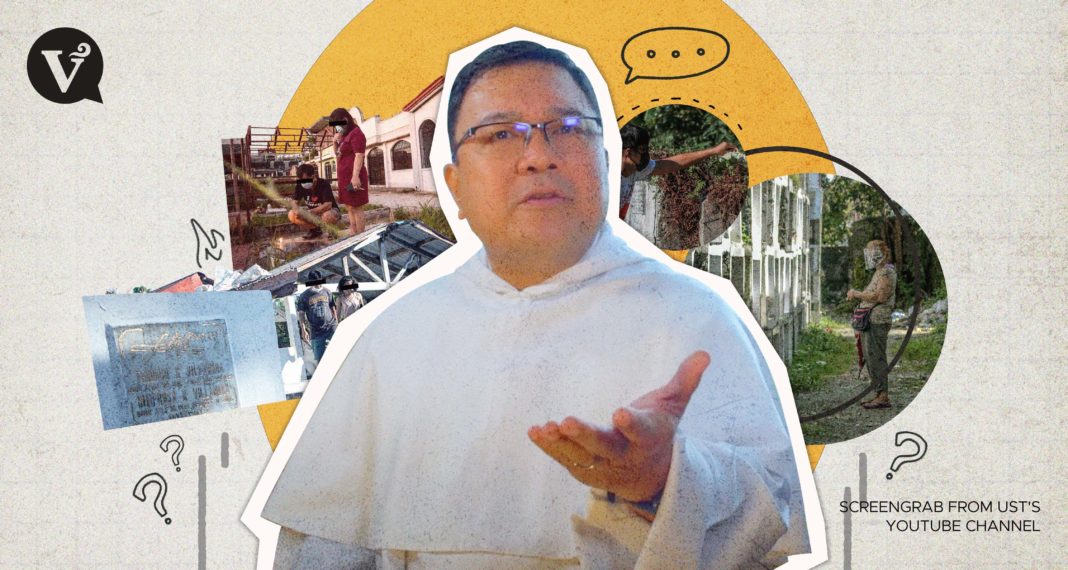DOMINICAN PRIEST Fr. Winston Cabading, O.P. said offering prayers and food for the dead would not affect their eternal destiny, in a five-part question-and-answer video series on Undas produced by the University.
“Wala nang effect ‘yung prayers natin sa eternal destiny ng mga yumao kasi sabi ni San Pablo, pag ang tao ay namatay, judgement na kaagad. So para sa atin, ‘yung judgement na ‘yan ibig sabihin n’yan ay papasok na siya sa eternal recompense, eternal destiny: heaven or hell. Salvation or damnation,” he said in a “Father Answers Questions” episode.
However, these prayers can be useful for souls in need of God’s mercy, specifically those in purgatory, Cabading said.
“Ang eternal destiny ng mga kaluluwa sa purgatoryo ay langit. Doon pumapasok ang ating mga panalangin para sa mga yumao,” he added.
Cabading, a former secretary general and College of Education regent, also discouraged Catholics from engaging in “occult ritualistic” activities such as necromancy.
“Hindi magandang humingi ng sign kasi baka hindi tayo prepared at higit sa lahat, hindi natin alam kung ‘yung nagbigay ng sign ay totoong nagsasabi,” he said.
“Walang assurance ‘yun na sila ‘yung pumupunta. More often than not, ‘yun ay isang mapanlinlang na espiritu, in other words, demonyo,” he added.
Cabading urged Catholics to pray instead to the saints who are “always alive with God.”
“Whenever we pray to the saints and ask them through intercession, it’s not to the dead that we are talking to, it is to the holy souls that are with God. They are alive,” he explained.
Cabading said Catholics will not be haunted by their deceased loved ones if they do not visit the cemetery.
“Kung sila’y nasa purgatoryo at nangangailangan ng ating mga panalangin, kung sila’y saka-sakaling pinahintulutan ng may-kapal na magparamdam, magpakita sa mga mahal sa buhay, isa lang hinihingi niya: ipagdasal sila,” he said.
Offering food to the dead was useless, he said.
“Hindi nila kailangan ‘yung pagkain. That is what food is all about—for our bodies to be strengthened from the nutrients that come from them. ‘Pag nag-alay ka ng pagkain sa puntod, ano’ng purpose nu’ng pagkain na ‘yun? Wala. In other words, lalangawin lang,” he said.
“They are now in heaven enjoying heavenly food. Hindi nila pakikinabangan ‘yung ipapakain mo sa kanila na kung ano mang masarap. Sayang lang. Mainam ang pagkain, kakainin ng buhay, hindi iaalay sa patay,” he added.
Cabading debunked the superstition that bringing home food from wakes would entail bad luck.
“Lahat ng pamahiin ay mali at hindi kalugod-lugod sa Diyos…Magtatapon ka ng pagkain, mas malaking kasalanan ‘yan. Sinabi nga ng mga matatanda, huwag magtatapon ng pagkain dahil ang bawat pagkain ay biyaya ng Diyos,” he said.
Cabading also explained how cremation was forbidden during the old times as it was deemed a denial of the resurrection of the dead.
“Ngayon, may mga pagbabago na ng isipan…pinapayagan na ng simbahan ang cremation provided that the motivation for cremation is not connected with the denial of the resurrection,” he said.
But the cremated remains of the deceased should be interred and not kept as mementos, he pointed out.
“Ngayon, nagiging gawain ng maraming tao na dahil may cremation, gusto nila ‘yung portion ng labi ng kanilang mahal sa buhay ay itatago nila sa locket at gagawing kwintas, ilalagay sa bracelet, itatago sa bahay para daw ‘yung memory ay naging sariwa—‘yang practice na ‘yan ay hindi ina-approve ng simbahan dahil kailangan pag-cinremate icoconsider mo rin siyang for burial,” he added.












